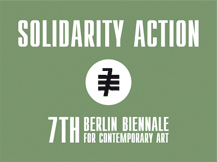We find ourselves in a moment of profound transformation in which widespread access to networks and technologies constantly alters imaginaries, operative possibilities and mental models of the human being, redefining concepts like that of belonging to a city, public space, modes of production and distribution of knowledge, the possibilities of communicating and cooperating, politics and identity. In this scenario the clash between “old” and “new” brings out dissonant narratives and unseen forms of conflict. In this scenario art can play a role of fundamental importance. More and more, art is coming to grips with scenarios that can cross sciences, disciplines, themes and different forms of expertise. In keeping with imaginaries that remind us of alchemy and the visions of Leonardo, art finds itself becoming in different cases a “strange attractor” in the anthropological sense, a sensor of social, cultural and technological trends, an inventor and activator of innovative political scenarios, a social recontextualizer, a driver of economic models. Research laboratories and companies (see the emblematic case of General Electric, ready to create entire laboratories focusing on the work of artists and designers) fill their spaces with artists to coordinate practices and disciplines in keeping with open, ground-breaking scenarios. This panorama can suggest interesting changes for politics, the administration of the “res publica”, the governing of cities, for social and economic innovation, as well as for the redefinition of what citizens, public space and the life in every part of the planet can be/become. In short, it is possible to imagine:
• Promoting different strategic and operative directions capable of crossing the sciences and the disciplines and in which the “new arts” – those that focus on the creation of ecosystems – play the role of glue, link, stimulator of imaginaries of the possible and the desirable, remixer of politics and poetics.
• Inventing real operative ecosystems capable of getting away from the logic of crowdsourcing and slacktivism and becoming instruments for the generation of new economies, in which the activities do not bring benefits only to the managing infrastructures.
• Getting out of the dialectic of conflict, abandoning the idea of hierarchy – also hidden by the various narratives that cross institutions, companies and movements – and replacing them with peer-2-peer models thanks to methods and technologies that make them usable, accessible and remunerative; to occupy the ‘real’, to fill it with new meanings, signifiers, original stratified and interconnected spaces.
• Abandoning the idea of representation, of government, of federation or joint ownership, procuring tools of interconnection and inter-relation; choosing to abandon democracy and embracing ethics, awareness and tolerance, impacting companies, institutions, organizations, groups, communities and individual citizens.
• Getting equipped to approach the future that will not be based on the big organizations but on a stratification of many small realities capable of autonomously producing energy, culture and wellbeing through listening, the creation of infrastructures and the maintaining of welfare and access.
SALVATORE IACONESI
Co-founder (with Oriana Persico) of REFF – Rome European Fake Factory, a platform of global debate, technological and artistic hacking, performance
and net-art.


